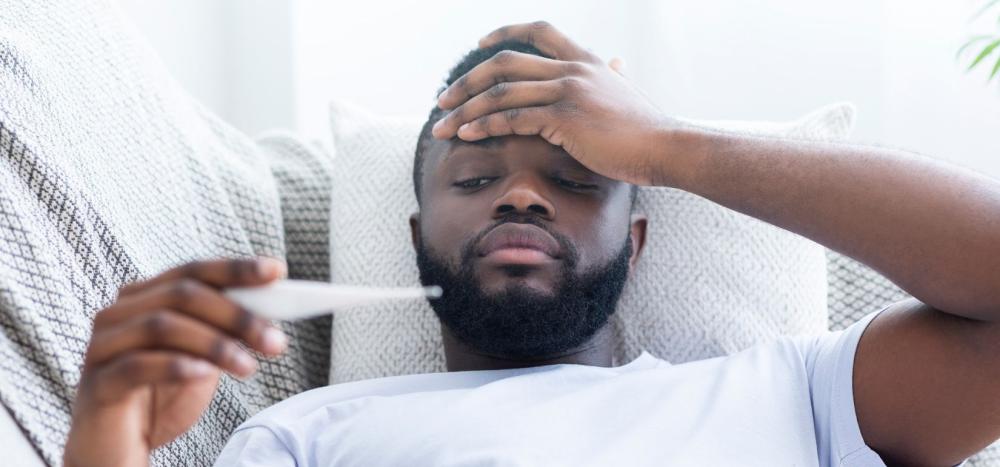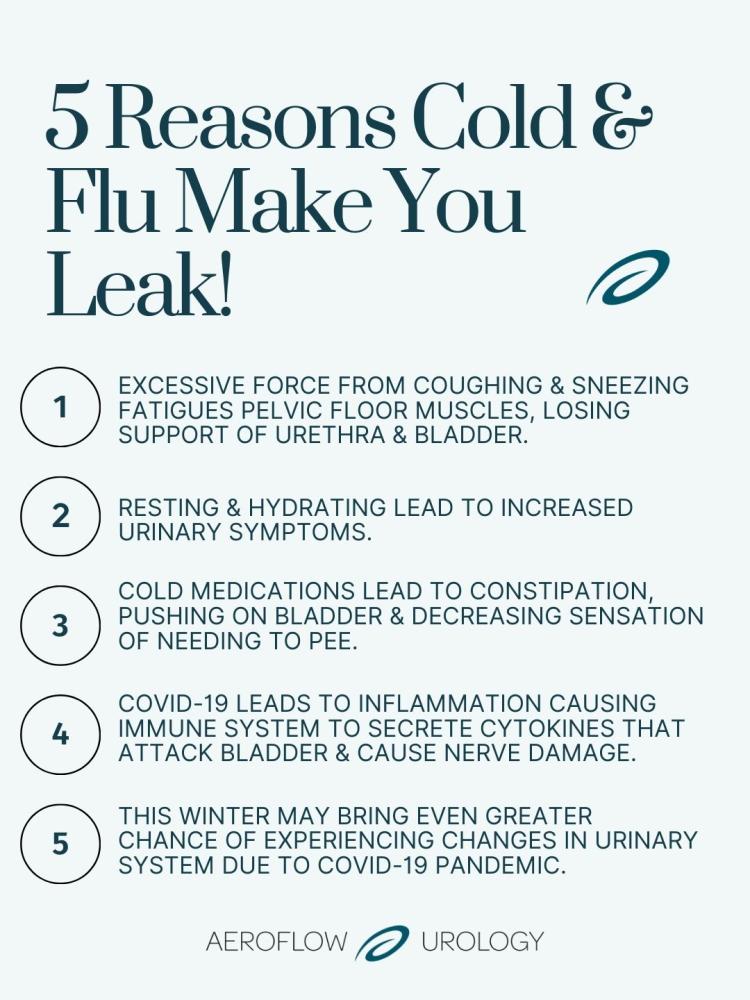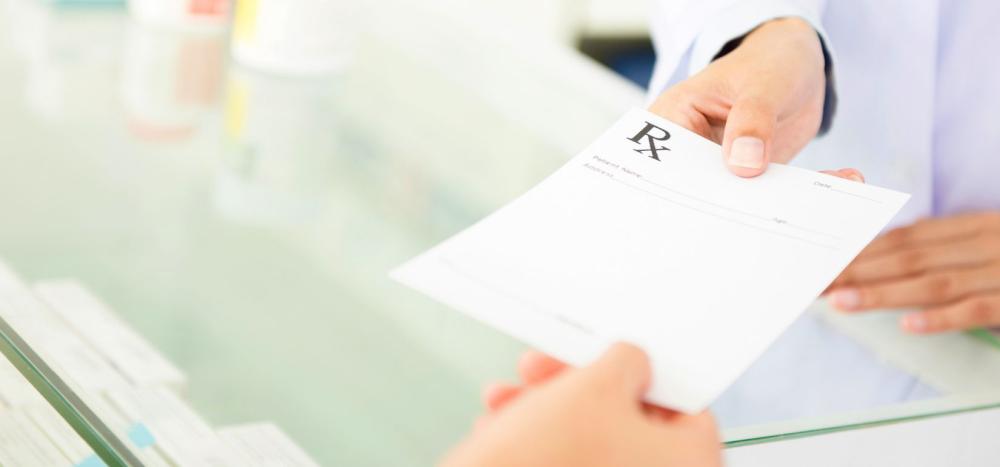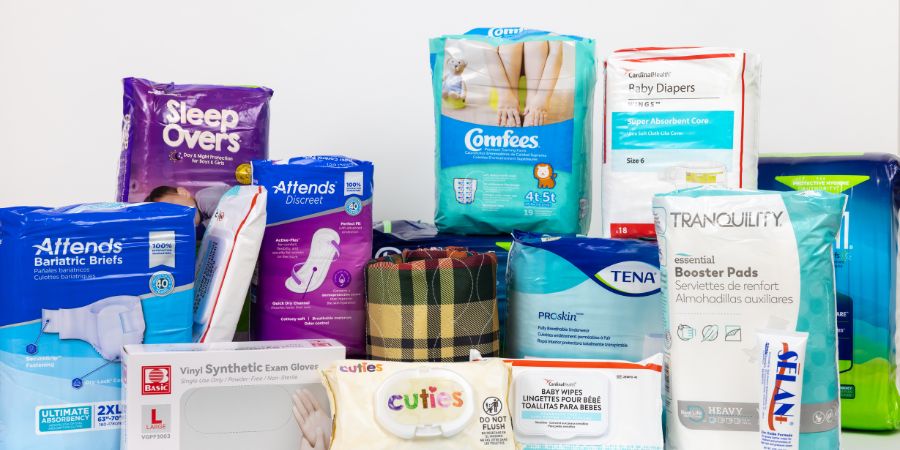Key Takeaways:
-
Colds, the flu, and COVID-19 can all trigger or worsen urinary incontinence. This is because coughing, sneezing, and high fluid intake can put pressure on your pelvic floor muscles.
-
Over-the-counter cold medicines can irritate the bladder and cause constipation, leading to more frequent urges and urine leaks during an illness.
-
Using bladder control products can help support you while you’re sick. If you’ve been diagnosed with incontinence, you may qualify for free bladder supplies through Medicaid or insurance with Aeroflow Urology.
As the seasons grow colder, many of us will experience colds, the flu, and COVID-19. While we often focus on the typical symptoms of these illnesses — fever, cough, fatigue, and sore throat — there's a symptom that isn’t well-known but can very much affect your health: loss of bladder control (urinary incontinence).
It may come as a surprise, but a link exists between these infections and your bladder. Whether it's the pressure exerted on your pelvic floor during a fit of coughing or sneezing, the side effects of over-the-counter (OTC) medications, or your body's inflammatory response when battling the flu, your urinary health can be impacted in unexpected ways.
How the Cold, Flu, & COVID-19 Cause Urinary Incontinence
Having a cold, the flu, or COVID-19 can cause you to experience common symptoms of urinary incontinence or the loss of bladder control, leading to urine leakage. Your bladder can be affected by illness due to pressure placed on your pelvic floor, recovering from illness, over-the-counter medications, and inflammatory responses to COVID-19.
Check your coverage for 100% free incontinence products now!
Check your coverage for 100% free incontinence products now!
Pressure On the Pelvic Floor
Upper respiratory infections or illnesses that irritate your chest and throat usually make you cough or sneeze. When coughing and sneezing, you’re placing pressure on your abdominal muscles, which also put pressure on your pelvic floor muscles.
The pelvic muscles are like a hammock to your bladder, bowels, and uterus, holding them all in place. They also allow you to control when you pee, known as continence. Excessive force from coughing and sneezing fatigues these muscles, and you lose the support of your urethra and bladder.
When you no longer have control over your bladder, you experience urinary incontinence — specifically, stress urinary incontinence (SUI). Stress incontinence causes urine leaks when sneezing, coughing, bending over, or lifting heavy objects.
Recovering From Illness
You need to rest and hydrate when you have a cold or the flu. While these are the proper steps to take to heal from sickness, they also explain why you begin peeing a lot when you’re sick:
- Resting: Decreased physical activity while recovering from an illness can lead to weakened muscles, particularly the pelvic floor muscles, which can worsen incontinence symptoms such as bladder leakage.
- Hydrating: Increasing your fluid intake causes your kidneys to filter more fluid from your body, leading to increased urination.
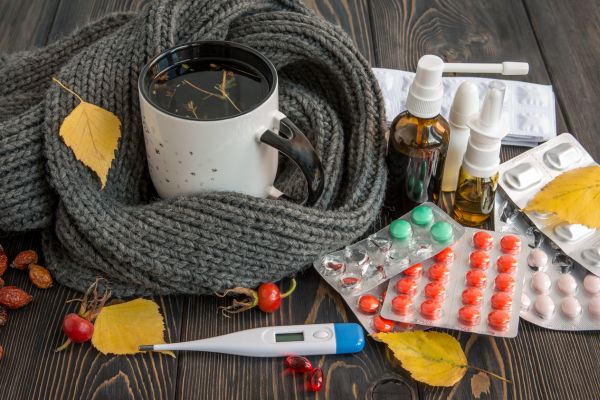

Over-the-Counter Medications
Many people opt for OTC medications to lessen cold or flu symptoms. However, certain OTC cold medications lead to constipation. The hard and backed-up stool that forms when you’re constipated pushes on your bladder and decreases the sensation of needing to empty your bladder, causing urine leakage and more frequent voiding urges. This can also lead to frequent urination, known as urge incontinence.
COVID-19 Inflammatory Response
When you contract COVID-19, your body has an extreme inflammatory response in which your immune system secretes cytokines (proteins) to fight the inflammation.
Cytokines directly attack your bladder and cause damage to the nerves that supply the bladder, leading to an increased urge to pee, related to urge incontinence. Even after recovering from a COVID-19 infection, you may still experience bladder control problems.
Increased Illness Due to the Pandemic
While there’s always a chance you’ll experience urinary incontinence symptoms while you have a cold or flu, the ongoing presence of COVID-19 can still bring about changes in your urinary system.
Seasonal waves of COVID-19 and upper respiratory infections continue to appear, and many people are still experiencing more frequent or longer-lasting colds than they were used to before the pandemic. There may also be increased illness and upper respiratory infections since our immune systems haven’t been as exposed to these viruses since the pandemic began.
Each time you’re sick, your body has extra opportunities to develop or worsen incontinence symptoms — especially with repeated coughing, sneezing, body aches, increased rest, less physical activity, and a higher risk of dehydration.
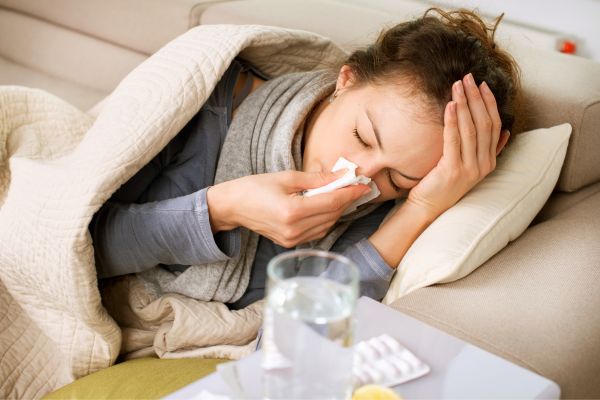

Check your coverage for 100% free incontinence products now!
Check your coverage for 100% free incontinence products now!
How to Reduce Leaks This Cold & Flu Season
Taking care of your body and bladder is vital this winter! Here’s what to do to keep things functioning properly:
- Hydrate. Staying hydrated helps your kidneys filter out bladder irritants present in the body while you’re sick. Drinking enough fluids also helps your body recover from illness by filtering out toxins.
- Empty your bladder often. Since you’ll be hydrating more when you’re sick, your bladder will fill up faster, so voiding more frequently can fight the sudden urge to urinate and accidents when your bladder fills up too quickly.
- Wear bladder control products. Incontinence products can help control bladder leaks if you’re experiencing incontinence symptoms. Many options are discreet and comfortable, such as:
- Bladder control pads: Absorbent pads that have an adhesive strip to stick to undergarments.
- Adult pull-ons: Made to look and feel like real underwear, these ultra-absorbent products will keep you dry and fit comfortably under your clothes.
If you need bladder control pads or protective underwear and have been diagnosed with urinary incontinence by your healthcare provider, you may be eligible to receive free products through Medicaid or insurance. See if you qualify in under 5 minutes today.
Extra Tips to Ease Frequent Urination When Sick
When you’re under the weather, you can follow these simple tips to support your bladder and reduce leaks:
- Exercise. You may not feel like it, but physical movement has been shown to help shorten a cold and keep your pelvic floor muscles strong. Try to move your whole body, and add pelvic floor exercises such as Kegel exercises to reduce leaks. To do Kegels, squeeze your pelvic floor muscles up and in, then hold and release.
- Supplement with aloe vera. Aloe vera has been shown to decrease inflammation in the body, improve your immune system, and soothe your urinary tract. You can take aloe vera supplements while you’re sick or when your urinary incontinence symptoms flare.
Remember to see a healthcare provider if you notice new or worsening urinary incontinence. Tell them about how you’re feeling so they can recommend lifestyle changes or treatments like incontinence supplies to ease your symptoms.
Check your coverage for 100% free incontinence products now!
Check your coverage for 100% free incontinence products now!
Frequently Asked Questions
Can the common cold cause frequent urination?
Yes, when you’re sick with the common cold, constant coughing, sneezing, and straining can put extra pressure on your pelvic floor. That stress on your pelvic floor, combined with drinking more fluids, can lead to an increased urge to pee.
Can the flu cause frequent urination?
Yes, the flu can cause frequent urination. This is because the flu often brings intense coughing and sneezing, which can exhaust your pelvic floor, leading to a stronger urge to urinate. Drinking more fluids can also increase urgency.
Why is my bladder weak when I have a cold?
Your bladder can feel weak when you have a cold because repeated coughing and sneezing strain your pelvic floor muscles. Over time, that pressure can fatigue them (make them tired), so they won’t support your bladder as effectively.
Disclaimer
Information provided on the Aeroflow Urology blog is not intended as a substitute for medical advice or care from a healthcare professional. Aeroflow recommends consulting your healthcare provider if you are experiencing medical issues relating to incontinence.


